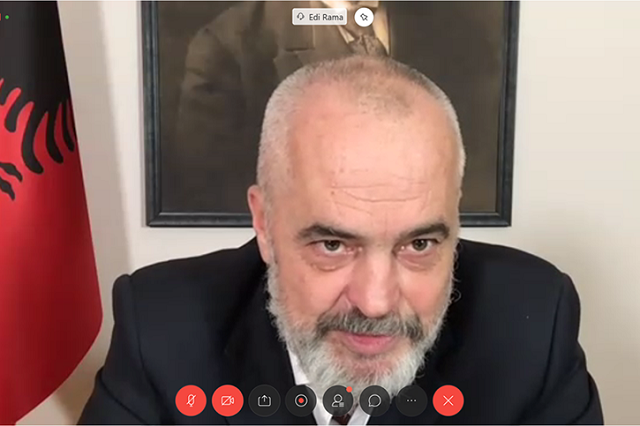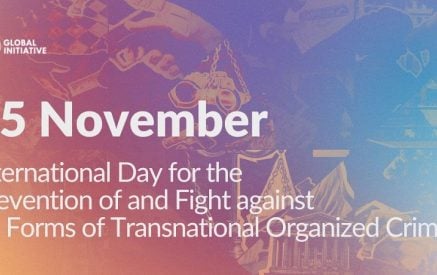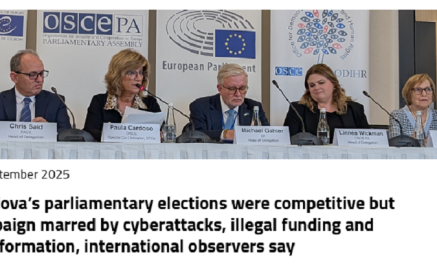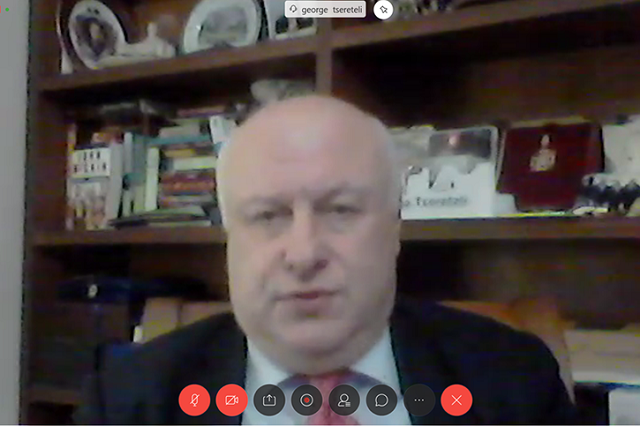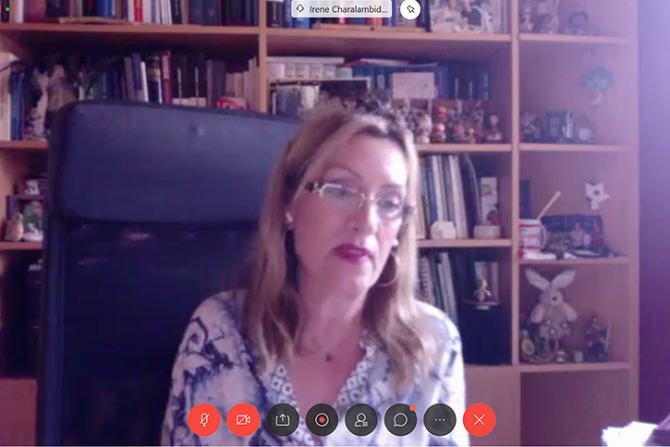COPENHAGEN, 28 April 2020 – The elected leaders of the OSCE Parliamentary Assembly met online Monday for the annual spring Bureau meeting, hearing presentations from the OSCE Chair-in-Office, Albanian Prime Minister Edi Rama, and EU Commissioner for Crisis Management Janez Lenarcic. The meeting, which usually takes place at the Danish Folketing, was held in an online format this year due to the coronavirus pandemic.
In his remarks, Prime Minister Rama noted the need for exceptional levels of co-operation between executive and legislative branches, stressing that parliaments have an important role to play during the COVID-19 crisis and that every effort must be made to ensure they can carry out their core roles of legislation and oversight. Parliaments can help to build social trust, he noted, and to ensure that the legitimate concerns of citizens are addressed. “Without trust it is impossible to maintain high levels of co-operation needed to save lives,” Rama said.
He also stressed that the OSCE will have to adapt as an organization to the new realities, with new prioritizations and efforts made to continue its important work on behalf of the people. “The challenges the OSCE faces are the same as our own: finding the right balance between getting things done and staying safe,” Rama said.
Commissioner Lenarcic reported on the European Union’s work to address the COVID-19 crisis, expressing confidence that the EU is functioning with solidarity and close co-ordination.
Read also
The pandemic is exacerbating complex problems, Lenarcic said, noting that the long-term consequences will be profound. The impact is worst on those who are already in a precarious state, which is why the EU is particularly focused on the impact on conflict zones, he said. The EU is also working to repatriate citizens who have been stranded due to air travel restrictions and to address the problem of international transport, Lenarcic said. It is imperative to increase EU support to countries outside of the EU, including those in the Eastern Partnership, he noted.
“Parliaments need to watch and make sure that when we get out of the crisis, we get out with our principles fully preserved,” he said.
In his report, President George Tsereteli (MP, Georgia) stressed that attention must be paid to the most vulnerable people, including those who live in conflict zones and migrant camps. He informed the members of recent correspondence he has had with the UN Secretary-General and the Director-General of the World Health Organization, and noted the challenges that the pandemic has presented to OSCE PA activities. In spite of this unprecedented challenge, he said, the continued engagement of parliamentarians ensures that the PA remains active.
Roberto Montella, OSCE PA Secretary General, reflected on the state of multilateralism in his remarks, underlining that the COVID-19 crisis has taught us that more international co-operation among governments, more solidarity among peoples, and more collaboration amongst health institutions is the way forward.
“During this crisis we have seen a concentration of power in the executives and more centralized policies,” Montella said. “If this is probably physiological in the urgency of the moment we need to be vigilant that this temporary state of affairs does not become the new normal and that parliaments fully exercise their natural function of control and oversight. Less autocracy and more democracy.”
The Bureau meeting also included reports by Chairs of Committees and OSCE PA Special Representatives. Vice-President and Chair of the Ad Hoc Committee on Migration Margareta Cederfelt (MP, Sweden) informed the Bureau of the committee’s first online meeting, scheduled for 6 May with participation expected by Member of the European Parliament Isabel Santos on the impact of the COVID-19 pandemic on migrants and refugees.
Austrian parliamentarian Reinhold Lopatka, Chair of the OSCE PA’s Ad Hoc Committee on Countering Terrorism, stressed that despite the current health crisis, traditional threats such as terrorism and violent extremism have not disappeared. “On the contrary, such conditions tend to create opportunities for terrorist groups to prosper and achieve their goals, as the attention of the world has shifted to fighting the pandemic,” he said. “Hence, following this topic in the time of crises is more important than ever.”
He noted that the CCT is currently exploring the possibility of holding a web-based meeting in early June.
US Congressman Chris Smith, the OSCE PA’s Special Representative on Human Trafficking Issues, noted that attention needs to be focused on trafficking during the pandemic, which he said has put victims at even higher risk.
“We must prioritize the fight against human trafficking, even during this crisis,” said Congressman Smith. “Traffickers are not shut down – they haven’t gone on a holiday. Victims still need to be rescued. Survivors still need assistance. Vulnerable people likely will be made even more vulnerable by both the virus and the economic impact of the response to it. And as a result, when things start to open back up, traffickers may have an easier time finding, deceiving, coercing and exploiting victims.”
“New patterns of exploitation are emerging due to increased online activity, greater use of social media, and social distancing practices,” Smith said. “This makes it even more clear that we need to take into account how new technologies affect our efforts to combat human trafficking.”
Special Representative on Fighting Corruption Irene Charalambides (MP, Cyprus) reported that a planned conference in Cyprus has been postponed. She urged the inclusion of clear anti-corruption safeguards in all public expenditures on coronavirus-related emergency economic measures.
Norwegian parliamentarian Torill Eidsheim, the OSCE PA’s Special Representative on Arctic Issues, noted that the current crisis can demonstrate the connection between climate, science and technology. She urged the importance of keeping the topic of climate change on the PA’s agenda going forward, as well as broader Arctic issues.
Special Representative on Anti-Semitism, Racism and Intolerance Ben Cardin (United States) reported that minority and immigrant communities are more vulnerable to the impact of the pandemic because of entrenched inequalities. COVID-caused disruptions in education may also have long-term disproportionate consequences for those already impacted by discriminatory schooling, he noted.
Treasurer Peter Juel-Jensen, in accordance with Rule 41.2, presented the Assembly’s proposed budget for the upcoming financial year for discussion. He noted that efforts would be made to relieve the financial burden on parliaments that may be facing revenue shortfalls due to the economic impact of COVID-19.
It was also reported during the Bureau meeting that the San Marino Autumn Meeting, scheduled for October 2020, is cancelled.
To download Secretary General Roberto Montella’s report, “OSCE PA – COVID COMPACT: Readapting the OSCE PA to Challenges in the Time of COVID-19 Pandemic,” please click here.
Photos of the Bureau meeting are available on the OSCE PA Flickr page.
OSCE PA
Main photo: Edi Rama




















































